

The subdued level of visible violence belies the true extent of the brutality at which the domination is exerted. In a World where most people are still being excluded from opportunities to better themselves and achieve prosperity, the ordinary people should struggle to reconquest the means needed to overcome the necessity to work for the few. That will then allow them to work for their mutual welfare in freedom.
Disruptive Technologies. Islamic threat, war on terror and the true face of neoliberalism. The subjugation of Greece. Struggle for democratization of the media. Battleground Education. Battleground energy revolution. Battleground Food Supply. Battleground Water Supply. Civil disobedience. Wir sind die Veränderung. Von Isabelle Krötsch, aufbauend auf der Zuschrift von Carmen Glandien Was kann ich tun, um die Erde zu einem besseren Ort zu machen?
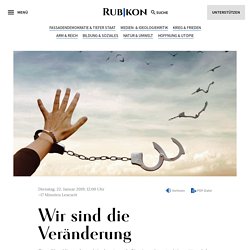
Vielleicht, so beschleicht mich ein Gefühl, ist es nur mein Versuch, durch Aktivismus der innerlichen Verzweiflung zu entkommen, die sich aus dem Ohnmachtsgefühl ergibt. Aber gleichzeitig spüre ich, dass steter Tropfen den Stein höhlt und jeder Tropfen derjenige sein kann, der ein Fass zum Überlaufen bringen kann, also auch im positiven Sinne. Jeder Gedanke, jedes Gefühl, das sich der friedfertigen Metamorphose widmet und sich nicht verrückt machen lässt von den immer wieder proklamierten Katastrophen und dem manipulativen Angstschüren, ist eine gewonnene Vision für die Zukunft. Und diese Zukunft liegt in unseren Händen. Sich einzubringen und die eigene Umwelt mitzugestalten, ist sowohl ein Grundbedürfnis des Menschen als auch seine Aufgabe. Was können wir also tun? Grundsteinlegung für eine Bahnstrecke zwischen Nord- und Südkorea. Quellen und Anmerkungen: Klimawende von unten. We Are One Community: Leading a Global Cooperative for The Highest Good of All.
One Community is a 100% volunteer-operated non-profit and non-governmental organization creating open source resources and solutions for all aspects of sustainable and globally regenerative living.
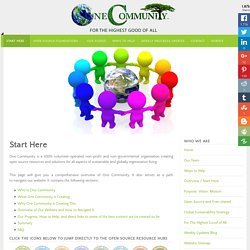
This page will give you a comprehensive overview of One Community. It also serves as a path to navigate our website. It contains the following sections: One Community is a 100% volunteer-operated non-profit and non-governmental organization. We’ve had between 300 and 400 volunteers contribute to bring the project to where it is now. Everyone who has worked on the project is a volunteer, there’s no monetary compensation offered. Click Here if You’d Like to Join Our Team One Community is creating open source and free-shared resources and solutions for Highest Good food, energy, housing, education, for-profit and non-profit economics design, social architecture, fulfilled living, stewardship practices and more.
These pages explain what we are creating from a global-change perspective: Think Like a Commoner. Email Facebook Twitter ShareThis About the Author David Bollier, is an author, activist, blogger and independent scholar who has studied the commons as a transformative paradigm for fifteen years.
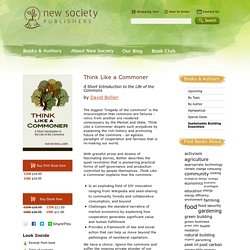
He is co-founder of the Commons Strategies Group, co-director of the Commons Law Project, and a frequent speaker and strategy advisor. Bollier is an author and editor of six books on different aspects of the commons, including Green Governance, The Wealth of the Commons and Viral Spiral. He blogs at www.Bollier.org and lives in Amherst, Massachusetts. view author profile A Short Introduction to the Life of the Commons by David Bollier The biggest "tragedy of the commons" is the misconception that commons are failures - relics from another era rendered unnecessary by the Market and State. With graceful prose and dozens of fascinating stories, Bollier describes the quiet revolution that is pioneering practical forms of self-governance and production controlled by people themselves. After Progress. Noam Chomsky on the Potential for Ordinary People to Make Radical Change. Noam Chomsky.
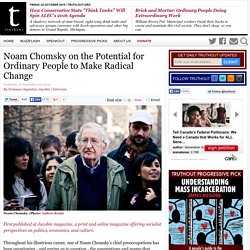
(Photo: Andrew Rusk) First published at Jacobin magazine, a print and online magazine offering socialist perspectives on politics, economics, and culture. Democracycollaborative.org. The Rise of Anti-Capitalism. Photo WE are beginning to witness a paradox at the heart of capitalism, one that has propelled it to greatness but is now threatening its future: The inherent dynamism of competitive markets is bringing costs so far down that many goods and services are becoming nearly free, abundant, and no longer subject to market forces.
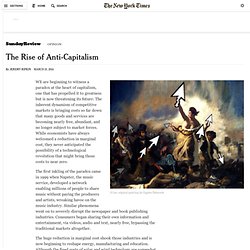
While economists have always welcomed a reduction in marginal cost, they never anticipated the possibility of a technological revolution that might bring those costs to near zero. The first inkling of the paradox came in 1999 when Napster, the music service, developed a network enabling millions of people to share music without paying the producers and artists, wreaking havoc on the music industry. Similar phenomena went on to severely disrupt the newspaper and book publishing industries. Consumers began sharing their own information and entertainment, via videos, audio and text, nearly free, bypassing the traditional markets altogether.